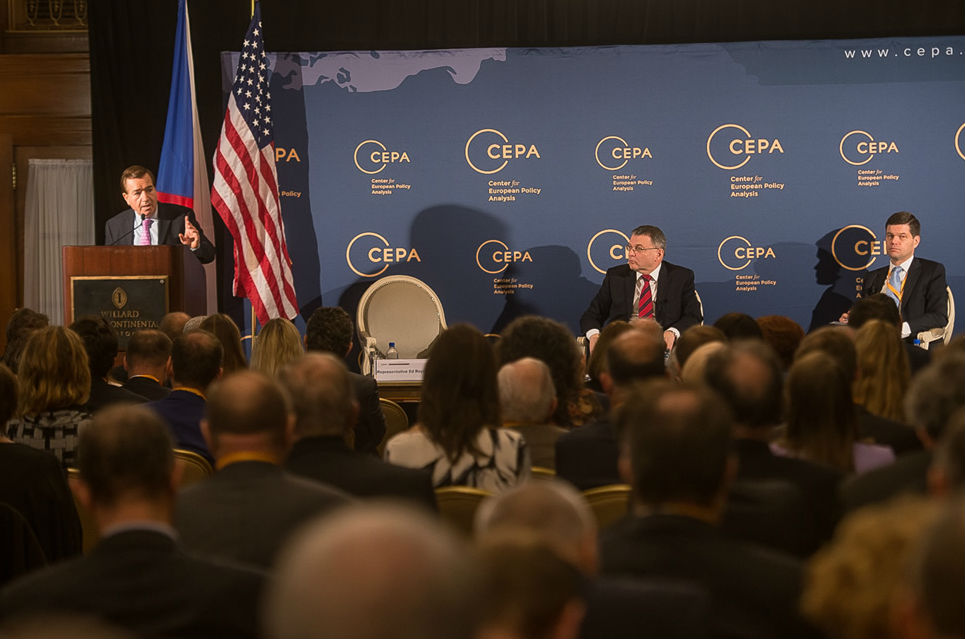 The West’s deteriorating relationship with Russia has opened a window of opportunity to offer Eastern European countries a genuine future within the European Union, unrestrained by Moscow. To seize this opportunity, the West should refrain from past policies that, in the end, always put Russia first.
The West’s deteriorating relationship with Russia has opened a window of opportunity to offer Eastern European countries a genuine future within the European Union, unrestrained by Moscow. To seize this opportunity, the West should refrain from past policies that, in the end, always put Russia first.
On October 1, Rep. Ed Royce (R-CA), speaking at the CEPA Forum 2015 in Washington, warned that Kremlin propaganda is gaining traction and confusing European societies about their values. The West, he said, should boost efforts to counter it with its own propaganda. But this approach is problematic. Certainly, there is nothing wrong with raising public awareness about the Kremlin’s unmistakable aim of shaking Western confidence. But EU and NATO member states are becoming increasingly obsessed with Russian propaganda and with Russia. This obsession demonstrates weakness and a deepening crisis of political confidence, leading to flawed policies.
How about focusing on what—if anything—is actually wrong with our system of democracy and governance? This is admittedly an uncomfortable exercise. Yet only honest reflection will help us improve governance, make liberal democracy more appealing, and strengthen our societies against such propaganda.
The propaganda war is but one piece of a larger mosaic. Ever since the 2008 Georgian war, the West has gradually accepted Moscow’s invitation to enter Russian President Vladimir Putin’s zero-sum world. Case in point: the Western argument that enlarging the EU and NATO would alienate Russia. The United States and its allies tried to prioritize their relations with Russia to appease Putin instead of taking seriously the Euro-Atlantic fate of other post-Soviet countries. Russia not only became increasingly alienated, but a political vacuum descended over Eastern Europe that Russia was only too eager to fill.
The West underestimated Russia and the time is ripe to overcome this complacency, or so the prevailing narrative goes. But that thinking was wrong. Overestimating Russia, a lack of political will, and too much complacency toward Eastern Europe helped create the conditions we are now witnessing in Ukraine. To put it plainly, we underestimated the immensity of the task of helping transform Eastern Europe. The West is not responsible for the internal failures and deficiencies of Ukraine, Moldova, or Georgia. But compared to less-troubled states like Poland, Hungary, or the Czech Republic two decades earlier, the United States and the EU invested much less in more complicated countries while expecting to see the same successful outcome.
So it is sad to see that after the unfortunate events in eastern Ukraine, the West is again focusing on Moscow. After many past disappointments, the West wants to solve Eastern Europe’s problems by working out some kind of strategy on Russia. In fact, NATO’s official response to Russia’s aggression in Ukraine has a code name: Strategic Adaptation. This sounds important, but what it means is that NATO has nothing better to offer than to adapt to Russia. This is precisely what it’s been doing in vain for nearly eight years. Credible deterrence, updated and realistic contingency planning, executable defense plans, effective military training, improved intelligence gathering, and a deep commitment to Article 5 is, of course, a must. But these elements should have been a natural step taken long ago regardless of Russia—instead of hastily talking about them now because of Russia.
To build NATO’s future around being trigger-happy is certainly not a proactive approach. In fact, nothing pleases Moscow more than to see the West sink even deeper into the antagonistic world of zero-sum games while gaining nothing in return.
Do we really believe that by simply deterring, containing, or confronting Russia Eastern Europe will automatically become a peaceful and prosperous place that looks to Brussels for guidance? Russia’s aggressive behavior should prompt the West to exclude the current Russian regime from the West’s thinking about Europe’s future. The West must come up a robust and credible policy of cooperation with Eastern Europe, leading to EU and NATO membership based on clear conditions. Even if the political leadership lags behind, positive energy abounds within Ukrainian, Moldovan, and Georgian civil society. Today, the West has an exceptional chance to tap into this energy and revive the idea of a Europe “whole and free.”
Realistically speaking, politicians lack the resolve and determination needed for the task. In fact, many fear supporting the “European dream” for Eastern Europe because it might be interpreted as a form of neo-colonialism, reduce support among ever-more nationalist and narrow-minded societies, or simply cost too much.
Most politicians see only as far as the next election. Plus, it is far more rewarding to beat the war drums against Russia or make deals with Moscow than commit to leading the long, costly, and painful process of Euro-Atlantic integration. If Western leaders cannot summon the courage and resolve, Europe will become a divided continent once again—with all the political, security-related, societal, economic, and cultural losses that implies—and no amount of soldiers or inflated defense budgets will stop that. In the event a confident “zero-Russia” approach toward Europe’s future provokes a hostile reaction by Putin and his cronies, the West will have offered Europe a future that might have become true. For now, we are in the midst of a hostile confrontation without having credibly offered anything.
Michal Kořan is deputy director of the Prague-based Institute of International Relations.
Image: On October 1, Rep. Ed Royce, speaking at the CEPA Forum 2015 in Washington, warned that Kremlin propaganda is gaining traction and confusing European societies about their values. The West, he said, should boost efforts to counter it with its own propaganda. Credit: Center for European Policy Analysis
